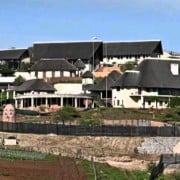|
Getting your Trinity Audio player ready...
|
 By David Lewis
By David Lewis
(This article was first published in City Press)
The recent Transparency International Corruption Perceptions Index puts South Africa in 67th place out of the 175 countries surveyed.
Those satisfied with mediocrity might think this is not too bad. People with this view must remember that our ranking dropped by about 30 places in the past six or seven years.
The bad news is that our score on the index (44 out of a possible 100) places us in a category that Transparency International says constitutes “significant corruption”.
A glimmer of good news may be found in the fact that our score and ranking have remained stable for the past three years. Our really big declines began about seven years ago, then plateaued.
But we can’t remain where we are – not only does our score place us in the category of countries in which corruption is significant, it also has us uncomfortably close to those in which corruption is “chronic” or “systemic”. We can’t hope to tread water indefinitely.
The results of the survey reflect Corruption Watch’s own assessment. We also see some good news, although our measure of good news might differ significantly from government’s. Equally, there is also very bad news of the kind that could cause us to drop drastically into territory from which there is little prospect of return.
Fight against corruption is alive and well
The really good news is that public outrage at corruption shows no sign of abating. Corruption can’t be confronted without the support of the public, which is visited with its costs.
The ubiquitous service delivery protests, the change in voting patterns, the fragmentation of the ruling party, the declining investment rates, the steady stream of reports to Corruption Watch – all of these attest to the fact that opposition to corruption is alive and well in this complex society.
Other good news is the palpable concern over burgeoning corruption demonstrated by many of those in both the public and private sectors. It is a source of comfort to us at Corruption Watch that the largest demographic reporting to us comprises public servants between the ages of 30 and 45. These are mid-level and senior public figures who, if not exactly “born free”, certainly grew up free.
This not only discounts the notion that all public servants are corrupt, it suggests that they might no longer be willing to take the bullet for their political masters. The refusal of the group of public servants to accept the role of scapegoats in the Nkandla matter is a case in point.
Another large slice of good news is that the courts are taking a robust view of tender malfeasance. The landmark Constitutional Court judgment that voided the R10-billion social grants tender is an example of this. The sentence imposed by the Supreme Court of Appeal on J Arthur Brown has demonstrated that there can be consequences when the rich rob the poor.
Serious problems to address
But our problems are deep. According to Corruption Watch, these are the most critical problems that all South Africans must address:
- Impunity at the top. All too often we see evidence that those with strong political connections are able to “get away” with corruption, with devastating knock-on effects. Take Nkandla as an example, where the president and his office have been widely discredited. The ministers who were called on to defend the president have been ridiculed and their offices are held in contempt by the public. Parliament has been contaminated by this scandal just as it was by the arms deal. As the president’s cronies hasten to his defence and lash out at those who, like the public protector, attempt to find the truth amid all the noise, so their offices suffer damage.
- The criminal justice system is the other side of the impunity problem. You can be sure that when politically powerful people have reason to fear prosecution, the first institutions that will be captured and compromised are those that make up the criminal justice system.
- Our procurement system is desperately in need of a thorough overhaul. We are particularly concerned that the procurement to support the projected infrastructure spend will go the way of the notorious arms deal. That is, into the pockets of corrupt government officials and their counterparts in the private sector. It’s clear that the extreme fragmentation of our procurement system needs to be reversed. The practice of public servants setting up businesses that in turn transact with the state also needs to be urgently checked. Introducing the obvious measures needed to deal with these problems will encounter resolute opposition from those who have fed off our procurement system.
- Local government is the place where perceptions of government are formed. All indications are that local government is in terrible shape. With new leadership at the department responsible for overseeing local government, there is a real prospect of reform. The public needs to get behind its efforts and we will do all we can to support it.
• David Lewis is executive director at Corruption Watch.








